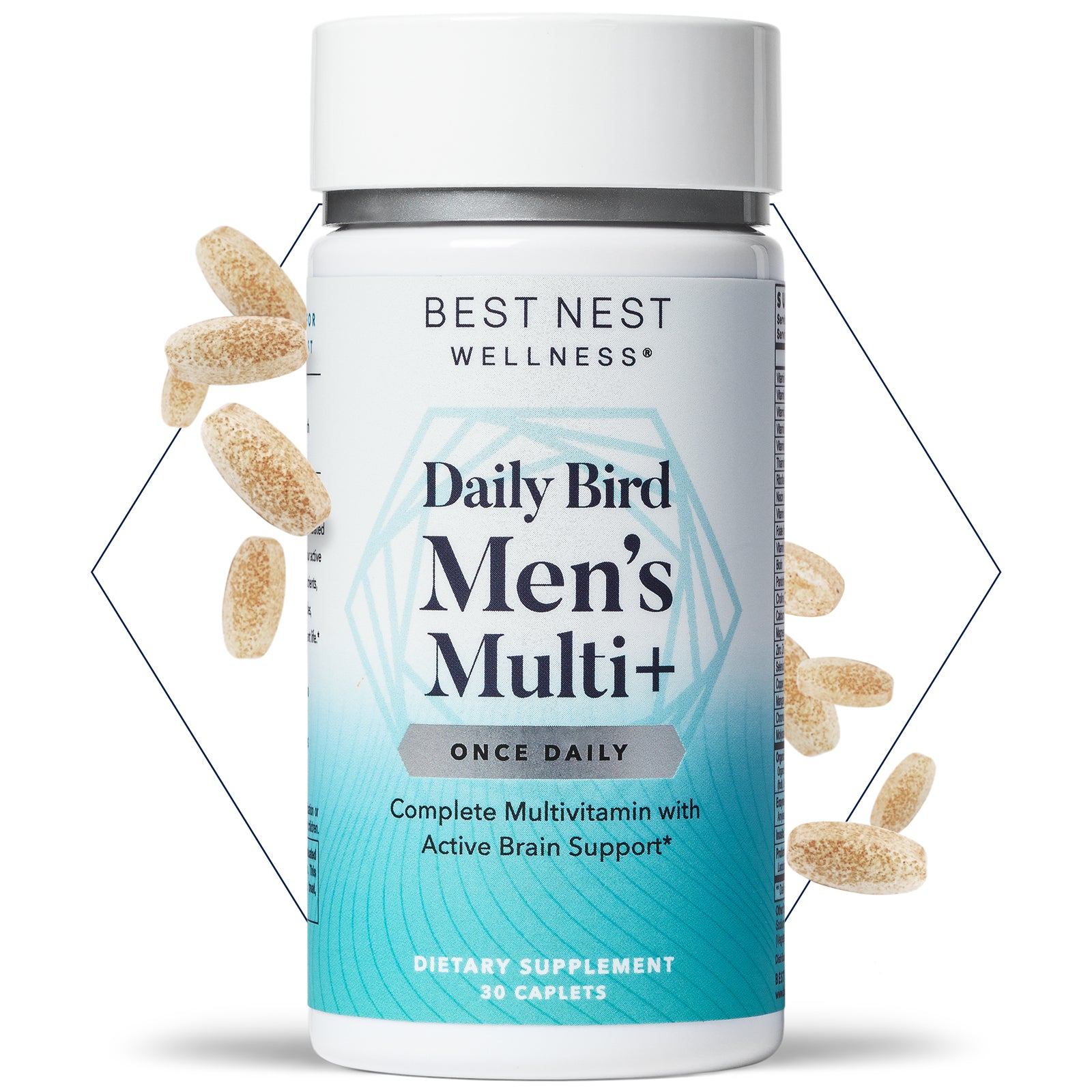Life gets busy. But, with the right supplements, you can enjoy enough energy and support to get through even your busiest days. It’s important to look for vitamins that truly meet your unique needs at this lifestage.
It’s important to find supplements that truly deliver the benefits you’re looking for. You may know the obvious things you need, but there are important nuances to look for when choosing your daily vitamins.
Beyond the expected, look for options that include these necessary ingredients:
Methylfolate
Folate supports your energy production (1, 2), brain’s processing speed (3), and memory (4). And it is needed for the synthesis of the neurotransmitters serotonin and dopamine (5), which affect sleep (6), cognitive function (7), and mood (8). And it also affects physical and emotional health.
Methylcobalamin
Methylcobalamin, also known as vitamin B12, is needed to make serotonin. Serotonin affects mood, sleep, memory, and more. It is also needed for the body’s energy production (9, 10). And when combined with Methylfolate, it helps the body form red blood cells and produces SAMe, a compound involved in immune function and mood. Together, they also help iron work better in the body.
Vitamin D
It’s possible for you to get vitamin D without worrying about sun damage. Proper vitamin D levels may boost mood (14), support immunity (15, 16), and build healthy bones—all so important at this life stage (17). Most people are deficient in vitamin D, so it’s important to add this supplement to your daily routine.
Probiotics
By adding probiotics to the above essentials, you can support a healthy gut-brain connection. Your gut, through its gut microbe system, influences your brain's function (18, 19). Plus, with probiotics, you’ll get the added benefits of supporting digestion, healthy regularity, and immune system health.
Omega-3
The beneficial fatty acids DHA and EPA are linked to healthy memory (20), brain function, cellular health and many more of your body’s processes. Many people do not get enough omega-3 from diet alone. In order to feel your best each day, increasing your intake of omega-3 EPA+DHA is important.
Looking for supplements with the above ingredients to support you in this lifestage? We’ve got you covered.
Men’s Multi+
is a neurologist-formulated multivitamin designed with active nutrients, whole-food organic fruits and vegetables, probiotics, and live enzymes for a vibrant life.
Probiotics
can help you feel your best from the inside out. As a highly concentrated probiotics supplement containing 50 billion+ organisms per capsule, it provides an effective amount of bacteria to help support your gut-brain connection and digestion.
Vitamin D Dropsare made from fractionated coconut oil (MCT oil) and vitamin D3. This sunshine-in-a-bottle supplement helps restore and maintain vitamin D levels. They contain no vitamin K2, which can interfere with medications.
Omega-3is a neurologist formulated omega-3 fish oil. Our sustainably-sourced fish oil has excellent absorption and only requires one daily softgel. It supports healthy brain function and memory, and is a foundation for cellular health
When it comes to supplements, remember the best ingredients make the best vitamins. Look for men’s products that were made just for your unique brain needs. When you choose high-quality options, you can feel the difference every day.
References
(1) Mitochondrial function and toxicity: Role of the B vitamin family on mitochondrial energy metabolism, Elsevier, Chemico-Biological Interactions, Volume 163, Issues 1-2, 27 October 2006, Pages 94-112.
(2) Vitamin B Supplementation: What's the Right Choice for Your Patients? J Psychosoc Nurse Ment Health Serv, 2017 Jul 1;55(7):7-11, doi: 10.3928/02793695-20170619-02.
(3) Effect of 3-year folic acid supplementation on cognitive function in older adults in the FACIT trial: a randomized, double-blind, controlled trial, Volume 369, Issue 9557, 20–26 January 2007, Pages 208-216.
(4) Short-Term Folate, Vitamin B-12 or Vitamin B-6 Supplementation Slightly Affects Memory Performance But Not Mood in Women of Various Ages, Janet Bryan, Eva Calvaresi, Donna Hughes, The Journal of Nutrition, Volume 132, Issue 6, June 2002, Pages 1345–1356.
(5) The Methylation, Neurotransmitter, and Antioxidant Connections Between Folate and Depression, Alternative Medicine Review. Sep2008, Vol. 13 Issue 3, p216-226. 11p.
(6) Serotonin control of sleep-wake behavior, Sleep Medicine Reviews, Volume 15, Issue 4, August 2011, Pages 269-281.
(7) Serotonin and human cognitive performance, Curr Pharm Des, 2006;12(20):2473-86.
doi: 10.2174/138161206777698909.
(8) Serotonin in Mood and Emotion, Handbook of Behavioral Neuroscience, Volume 21, 2010, Pages 367-378.
(9) Mitochondrial function and toxicity: Role of the B vitamin family on mitochondrial energy metabolism, Chemico-Biological Interactions, Volume 163, Issues 1–2, 27 October 2006, Pages 94-112.
(10) The Role of Vitamins and Minerals in Energy Metabolism and Well-Being, Journal of Internal Medical Research, Volume: 35 issue: 3, page(s): 277-289, Issue published: May 1, 2007.
(11) Erythropoietin, iron metabolism, and red blood cell production, Semin Hematol, 1996 Apr;33(2 Suppl 2):5-7; discussion 8-9.
(12) Iron deficiency and cognitive functions, Neuropsychiatr Dis Treat., 2014; 10: 2087–2095, Published online 2014 Nov 10.
(13) Iron homeostasis in host defence and inflammation, Nat Rev Immunol, 2015 Aug;15(8):500-10. doi: 10.1038/nri3863. Epub 2015 Jul 10.
(14) Vitamin D and Depression: Where is all the Sunshine? Issues Ment Health Nurs. 2010 Jun; 31(6): 385–393.
(15) Vitamin D and the Immune System, J Investig Med. 2011 August ; 59(6): 881–886.
(16) 1,25-Dihydroxyvitamin D3 Restrains CD4+ T Cell Priming Ability of CD11c+ Dendritic Cells by Upregulating Expression of CD31, Front. Immunol., 28 March 2019.
(17) Vitamin D and Bone, Curr Osteoporos Rep. 2012 June ; 10(2): 151–159.
(18) The effects of probiotics on depressive symptoms in humans: a systematic review, Ann Gen Psychiatry. 2017; 16: 14. Published online 2017 Feb 20.
(19) Psychobiotics and the Manipulation of Bacteria–Gut–Brain Signals, Trends Neurosci. 2016 Nov; 39(11): 763–781.
(20) Docosahexaenoic Acid and Adult Memory: A Systematic Review and Meta-Analysis, PLOS 1, 2015; 10(3): e0120391.











